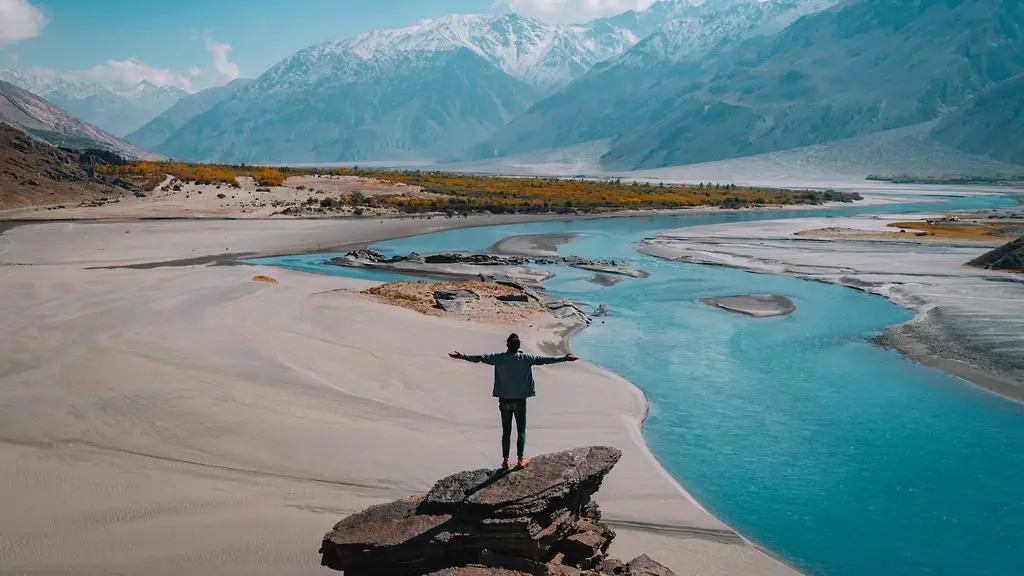The Nile River has been an essential source of life and survival for the people of Egypt for thousands of years. As such, it was hugely important to the Egyptians and played a significant role in their culture and society. The vast delta of the Nile was an incredibly rich and abundant source of food and materials, which enabled the Egyptians to survive and develop their unique culture and civilisation. Egypt’s continual success in ancient times was in large part thanks to the copious amount of resources the Nile River provided.
The Nile River provided Egypt not only with resources, but also with an efficient network of transportation. This network made it possible for goods and goods needed to be moved quickly and efficiently, making trade and commerce much more lucrative and profitable. It also allowed the Egyptians to easily move their military from one region to another in order to defend against invaders or to launch offensives against their enemies. In short, the Nile River allowed the Egyptians to move faster and farther than many of their contemporaries at the time.
In addition to the resources and transportation benefits, the Nile River also provided Egypt with a dependable source of irrigation for their crops. The Egyptians understood that their rise and success was directly related to the bountiful harvests their farmers were able to cultivate on the banks of the river. By controlling the flow of the river, the Egyptians were able to maximize productivity and efficiently use the land for agricultural production.
The Nile River did not only benefit the Egyptians during their rise as a major world power. Even today, the river remains vitally important to the Egyptian people, providing food and livelihoods to millions of people in the country. This is especially true in rural areas, where the majority of the population depends on the river to sustain their families and to earn a living. The importance of the Nile to the people of Egypt cannot be stressed enough.
Moreover, the Nile River also remains an important symbol and source of pride for the people of Egypt. The river has been the central part of their culture and identity for millennia, and it is still considered a national symbol of strength and resilience. The Egyptians understand that the Nile River is not only an important part of their present-day success, but also of their ancient history, and use this as a source of motivation.
The Nile in Religion
The Nile River has also been an important part of the religion and beliefs of the ancient Egyptians for centuries. The Egyptians believed that the sun god Ra was born from a lotus flower which emerged from the waters of the Nile. The river was seen as a source of life and fertility, and many gods, like Osiris and Hapy, were associated with it. It was also believed that the souls of the dead crossed the river in order to reach the afterlife.
The Nile served as a focal point for religious ceremonies and rituals. Numerous temples were built on the banks of the river and religious festivals were celebrated along the banks. The Egyptians even had a special ceremony called the “Feast of the Inundation”, which celebrated the river’s annual inundation and the fertility it brought to the land.
Trade Along the Nile
The Nile was an important part of the Egyptian economy, as it served as the main route for goods, goods and services across the country. This made trading much more convenient and allowed goods from other countries to be brought in, allowing for foreign trade and commerce. The Nile was also used for fishing, and for the transport of agricultural goods to be sold in other parts of the country.
The Egyptians also used the route of the Nile River to send messages to different parts of the country. They placed beacons along the river, which allowed messages to be sent and received quickly and efficiently. This allowed the Pharaoh to keep his subjects informed of any important news or developments taking place in the kingdom.
The Building Blocks of the Ancient Egyptian Civilization
The Nile River was the foundation upon which the ancient Egyptian civilization was built. It provided the resources and transportation necessary for their development and success. It provided the means for trade, communication and religious ceremonies to take place. Ultimately, the Nile River was one of the most important elements of the successful ancient Egyptian culture.
The Aftermath of the Nile
The legacy of the Nile is still felt in Egypt today, as many of the ancient ways of life still depend on it. The river remains the centre of many people’s religious ceremonies and a vital source of food and sustenance. Its importance to the country cannot be denied and its role in Egyptian history is undeniable.
Environmental Impact of the Nile
Unfortunately, the Nile is not only important to the Egyptians but has also been the victim of environmental damages over the centuries. Due to a combination of over-fishing, over-cultivation, and pollution, the river’s biodiversity has been greatly reduced, with many species of fish, birds and mammals having been wiped out.
Today, the Egyptian government is attempting to reverse the damage done to the river and restore its natural balance. This includes reintroducing native species, cleaning up the water, and developing better methods of irrigation and farming. All of this, in addition to the stricter regulations and enforcement of laws, will hopefully allow the river to again become an essential source of life for the Egyptians in the near future.
The Nile and the World
The importance of the Nile River does not only relate to the Egyptians, but has also been an important source for the rest of the world. The river has been vital for trade, travel and exploration throughout history. Egyptians have also been known to export goods and services, such as their papyrus paper and spices, across Africa and the Middle East.
The Nile has also inspired many great works of literature, such as those by the ancient Greeks and Romans, as well as by more modern authors who have drawn inspiration from the river’s majestic beauty. In short, the importance of the Nile to the entire world cannot be overstated.
The Future of the Nile
The future of the Nile depends largely on the inhabitants of the countries it flows through and how they manage the river’s resources on a day to day basis. The Egyptians will need to continue their efforts towards restoring the river’s balance and encouraging sustainable use of its resources. By doing this, the Nile can once again become a source of life, nourishment and inspiration for millions of people in the future.


